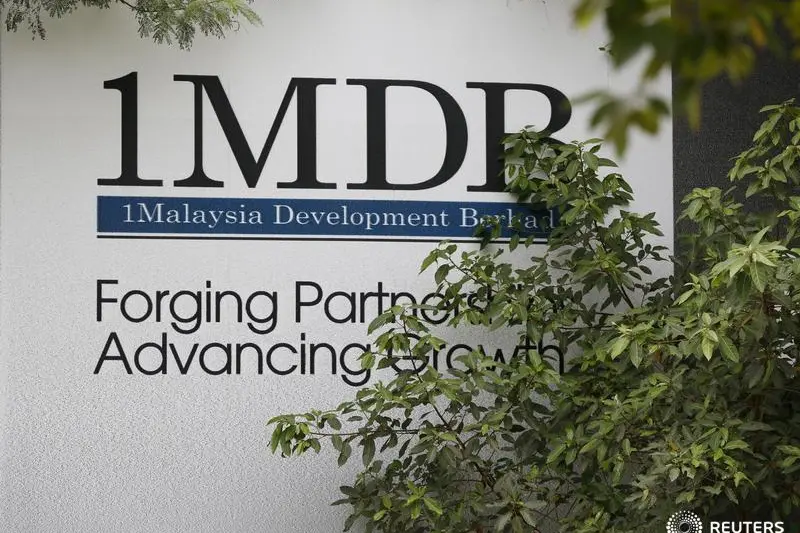PHOTO
KUALA LUMPUR, June 22 (Reuters) - The corruption scandal at 1Malaysia Development Berhad (1MDB) and upcoming elections pose potential challenges for Malaysia's sovereign rating in the short term, Standard and Poor's said on Thursday.
The rating agency maintained its A-/A-2 foreign currency and A/A-1 local currency ratings on Malaysia, saying the challenges will not materially impede policy flexibility and responsiveness. It also said Malaysia's outlook was "stable."
"Ongoing political challenges in relation to the corruption allegations of 1MDB, combined with the approaching elections, pose potential challenges to the sovereign rating over the near-to-medium term," S&P said in a statement.
"Those challenges could manifest themselves via a rise in the cost of refinancing Malaysia's sizable gross external financing needs, or via nonresident outflows from Malaysia's deep local-currency government bond market," it said.
State investment fund 1MDB is the subject of money laundering investigations in at least six countries. The U.S. Justice Department alleged in civil lawsuits filed last week that about $4.5 billion of funds were misappropriated from 1MDB.
Prime Minister Najib Razak has denied taking money from 1MDB for personal gain, after it was reported that investigators traced nearly $700 million to his bank accounts.
Najib has consistently denied any wrongdoing and local authorities have also cleared him of any wrongdoing.
Government sources have told Reuters that Najib could call elections in the second half of this year. General elections have to be held by mid-2018.
S&P also flagged a few credit risks: high share of foreign ownership of Malaysia's ringgit-denominated government bonds, and the central bank's record-high forward position on its foreign-exchange reserves.
Foreigners, who had held about half of the outstanding Malaysian government bonds, fled the market between November 2016 and March this year after the central bank said they could no longer trade in ringgit non-deliverable forwards. Some investors started to return since April.
"A continued sell-down of foreign-owned securities could undermine Malaysia's external buffers. At the same time, we maintain that risks of external outflows are attenuated by our expectations of continued sound policymaking," S&P said.
The central bank's short forward position hit an all-time high of $19.1 billion in April. While Malaysia's headline reserves have remained stable over recent months, its dollar borrowings in the form of currency swap deals have risen steadily from around $2.8 billion in October.
S&P said its forecast assumes that pressure on reserve coverage will level off over the next one to two years.
(Reporting by A. Ananthalakshmi; Editing by Jacqueline Wong) ((ananthalakshmi.as@thomsonreuters.com; +603 2333 8036; Reuters Messaging: ananthalakshmi.as.thomsonreuters.com@reuters.net; Twitter: @AnanthalakshmiA))
The rating agency maintained its A-/A-2 foreign currency and A/A-1 local currency ratings on Malaysia, saying the challenges will not materially impede policy flexibility and responsiveness. It also said Malaysia's outlook was "stable."
"Ongoing political challenges in relation to the corruption allegations of 1MDB, combined with the approaching elections, pose potential challenges to the sovereign rating over the near-to-medium term," S&P said in a statement.
"Those challenges could manifest themselves via a rise in the cost of refinancing Malaysia's sizable gross external financing needs, or via nonresident outflows from Malaysia's deep local-currency government bond market," it said.
State investment fund 1MDB is the subject of money laundering investigations in at least six countries. The U.S. Justice Department alleged in civil lawsuits filed last week that about $4.5 billion of funds were misappropriated from 1MDB.
Prime Minister Najib Razak has denied taking money from 1MDB for personal gain, after it was reported that investigators traced nearly $700 million to his bank accounts.
Najib has consistently denied any wrongdoing and local authorities have also cleared him of any wrongdoing.
Government sources have told Reuters that Najib could call elections in the second half of this year. General elections have to be held by mid-2018.
S&P also flagged a few credit risks: high share of foreign ownership of Malaysia's ringgit-denominated government bonds, and the central bank's record-high forward position on its foreign-exchange reserves.
Foreigners, who had held about half of the outstanding Malaysian government bonds, fled the market between November 2016 and March this year after the central bank said they could no longer trade in ringgit non-deliverable forwards. Some investors started to return since April.
"A continued sell-down of foreign-owned securities could undermine Malaysia's external buffers. At the same time, we maintain that risks of external outflows are attenuated by our expectations of continued sound policymaking," S&P said.
The central bank's short forward position hit an all-time high of $19.1 billion in April. While Malaysia's headline reserves have remained stable over recent months, its dollar borrowings in the form of currency swap deals have risen steadily from around $2.8 billion in October.
S&P said its forecast assumes that pressure on reserve coverage will level off over the next one to two years.
(Reporting by A. Ananthalakshmi; Editing by Jacqueline Wong) ((ananthalakshmi.as@thomsonreuters.com; +603 2333 8036; Reuters Messaging: ananthalakshmi.as.thomsonreuters.com@reuters.net; Twitter: @AnanthalakshmiA))





















